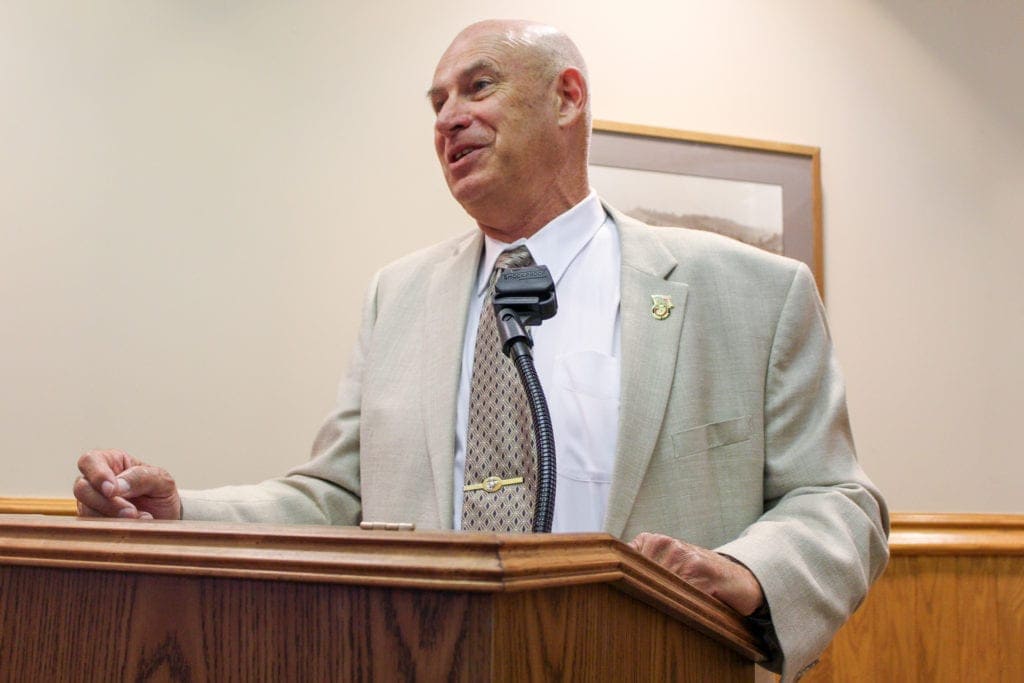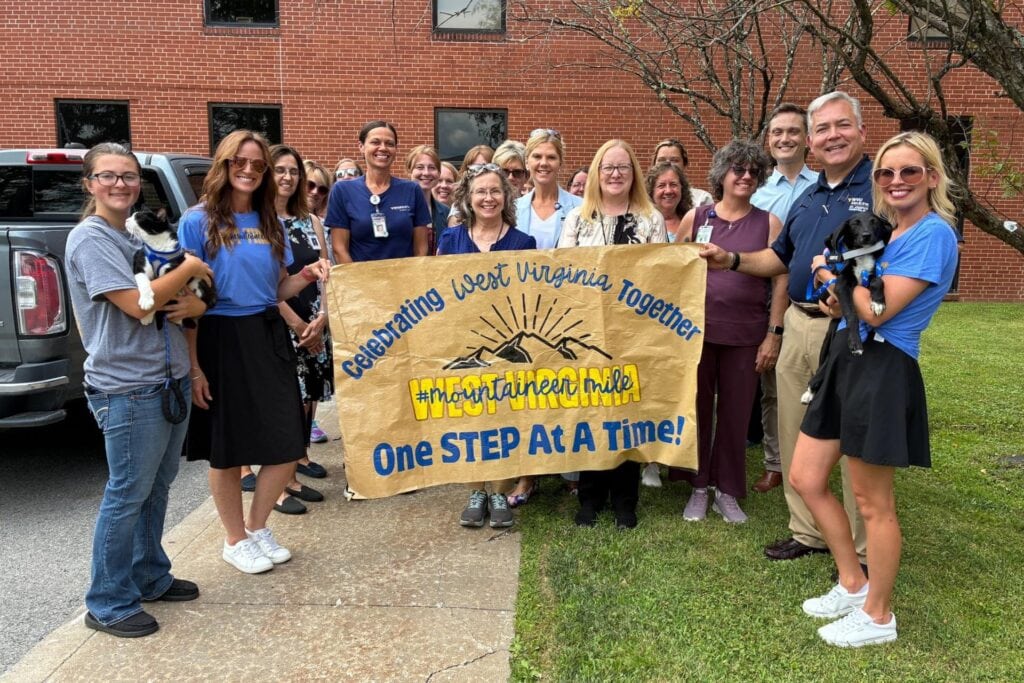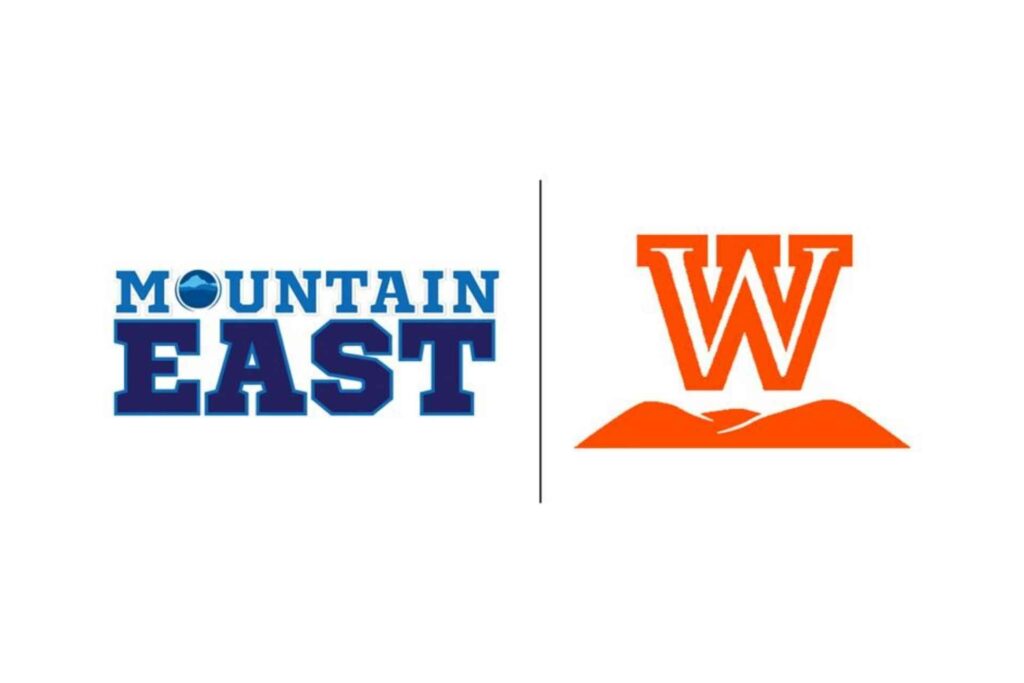BUCKHANNON – A representative of the West Virginia Department of Agriculture came to Thursday’s Upshur County Commission meeting to talk about their ‘growing’ programs.
Commissioner of Agriculture Kent Leonhardt said West Virginia’s Department of Agriculture is a little different than most states.
“West Virginia is one of 12 states that elects the Commissioner of Agriculture,” Leonhardt said. “The other 38 states, the governor appoints the Director, Secretary or Commissioner of Agriculture, most of us in southern states that are elected. As such, I work for you all, and not the governor, so that’s very important distinction.”
He said he came before the Upshur County Commission because even though his is an elected position, most people don’t know what his department does. He talked about one of its latest projects, which was to take the farmland assessment process online.
“The farmer can pull up what he wrote last year, make the adjustment, click and it’s done,” Leonhardt said. “It worked very successfully last year, and every county is now coming on board. It’s a chance to adjust things easier and not have to reprint so many forms. Yet, those citizens and those people that are in the agricultural world that don’t have [online access] in the rural areas, they can still do it by paper.”
Another program he said will be implemented soon is called the Fresh Food Act through which all state institutions will be required to buy 5 percent of fresh produce, meat and poultry products from a local farmer.
“That can be meat, poultry or produce, to fulfill their budgets,” Leonhardt said. “Now, there’s going to be a phase-in period. We just filed the initial for the rules to that bill, so if you want to look at it, and comment on it, we certainly would welcome that you do that.”
On an everyday basis, he said the Department of Agriculture is 90 percent a regulatory agency and 10 percent business development.
People take for granted eating from a safe, affordable and abundant food supply, Leonhardt said.
“Good food and clean water are very essential aspects to our daily lives, and we often take that for granted. Part of that regulatory thing I talked about is consumer protection.”
He mentioned certain instances of quality control that did not pass, such as a bird seed company that was kicked out of the state because they were filling up bags with wood chips; he said the department even quality checks the McDonald’s soft-serve machine.
“I am starting to talk with some of the economic development authorities, and I’m working very closely with commerce, because when they redesign the way economic development is done in the state, I believe they’re going to put 12 pillars in, and one of those pillars is going to be agriculture, and I firmly believe that agriculture can be part of the diversification of the state’s economy,” Leonhardt said.
He said an important part of the economy the Department of Agriculture is involved in is farmers markets.
“We’re trying to write the rules for the new farmers market where the Department of Agriculture has been given control over the inspection, and there’s still a little conflict between the health department and the farmers and the way things are done particularly on the Ag side, but we’re working on that,” Leonhardt said.
The Department of Agriculture doesn’t just regulate food either.
“We have laboratories in Moorefield that support the poultry industry, they also support the Chesapeake Bay initiative,” Leonhardt said. “Everybody knows the Chesapeake Bay was highly polluted and the Potomac River Basin flows into that Chesapeake Bay, and you can be very proud that we are the only state meeting the Chesapeake Bay mandate, and we’re doing it voluntarily. All other states are way behind, and we’re doing it through education.”
Leonhardt said he likes to think education is just as important to their job as regulating.
“I was so proud when I was at a farmers market meeting; one of my hardcore regulators said, ‘we’re here to educate before regulate,’ and that’s what we’re trying to do,” Leonhardt said. “I throw it out to you if you ever have a problem or an issue with anything that’s happening, I want you to contact me. I want to make sure that we’re business friendly, but yet, will protect the public health.”
He also talked about the work the Department of Agriculture does with the schools in West Virginia. ‘
“Most people don’t realize that we deliver 15 percent of the food that goes to the schools in the state,” Leonhardt said.” Through a USDA Food Program, we have five tractor trailer trucks on the road every day of the week during the school year.”
He said part of that program is working with a West Virginia company that was awarded a $42 million contract for five years with a commitment to buy West Virginia products.
“Now they’re not going to be able to meet all of that, they’re still going to go out of state, but prior to this awarding of the contract, the previous five years went to an Ohio company and they would buy all Ohio produce and bring it into West Virginia,” Leonhardt said. “There’s another $42 million that your Department of Agriculture is now bringing in.”













